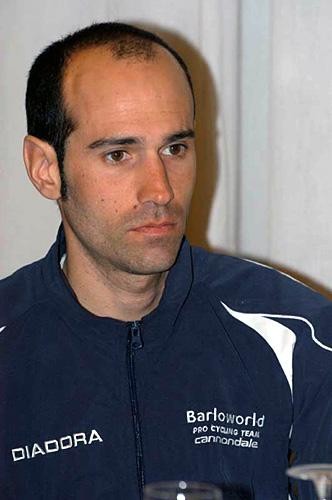Astarloa retires with good and bad memories
33-year-old ends career this weekend

Igor Astarloa is sure to get mixed reviews as his racing career comes to an official end when his home town of Ermua pays tribute to him on Saturday. Winner of the world road title in Hamilton and Flèche Wallonne in 2003, the 33-year-old Basque has had a chequered career since.
Released by Milram in May 2008 for irregular blood readings, his subsequent Amica Chips team folded for financial reasons in May 2009, and a month later he was one of the first five riders announced as having abnormal blood values under the UCI’s biological passport testing program.
Although he insists he has done nothing wrong and could probably find another team to hire him this season, Astarloa says he’s had enough. His final act in professional cycling is likely be an appearance at Saturday’s celebration in Ermua, which has been organised by long-time cycling sponsor Cafés Baqué, whose president, María Baqué, also happens to be his wife.
Contacted by El Mundo Deportivo at the family’s second home in Miami, Astarloa described Saturday’s tribute to him “the best way of finishing my career with a good memory”. He also admitted that since winning the 2003 world title, he’d had precious few of these. Even in the wake of that victory he had to counter rumours that he had tested positive.
“The year that I won the Worlds was very good, and the following one with Cofidis was also quite good… But, since then, cycling has changed quite a bit. Things have become very complicated, we are persecuted, we constantly have to give details on where we are… this crisis isn’t helping attract sponsors to the sport at all,” he explained.
Astarloa denied that he had been forced out of the sport by recent scandals, maintaining he could have found a new team. “But cycling isn’t the same as when I started. We used to really enjoy ourselves, there was a good atmosphere between everyone. Having spent 10 years as a professional and seen the before and the now, where you are always under suspicion and there are all kinds of bad affairs, I’m bowing out voluntarily.”
Asked how he felt at being linked to doping despite never having tested positive, Astarloa commented: “Simply because someone suspects you, they eliminate you from cycling. I have been racing bikes for 22 years. All that you’ve done in your life is finished because of suspicion. You don’t need to have tested positive. I see all too well that things aren’t fair at all. It’s better to leave this bad environment and find a better place to be. I’ve never tested positive, I’ve kept racing and I’m not even sanctioned.”
Get The Leadout Newsletter
The latest race content, interviews, features, reviews and expert buying guides, direct to your inbox!
He added that he would change nothing in his career, but again stated that “this isn’t how cycling was before… I don’t know who’s going to ride bikes in future. This sport is hard enough already without them placing more obstacles in front of you. You’d be better off racing motorbikes now.”
Astarloa concluded by saying the thing he will miss most about racing is “the atmosphere of competition. I will keep riding a bike because I’ve loved doing that all my life, but not being able to pin a race number on my back is what I’ll miss the most.”
Peter Cossins has written about professional cycling since 1993 and is a contributing editor to Procycling. He is the author of The Monuments: The Grit and the Glory of Cycling's Greatest One-Day Races (Bloomsbury, March 2014) and has translated Christophe Bassons' autobiography, A Clean Break (Bloomsbury, July 2014).